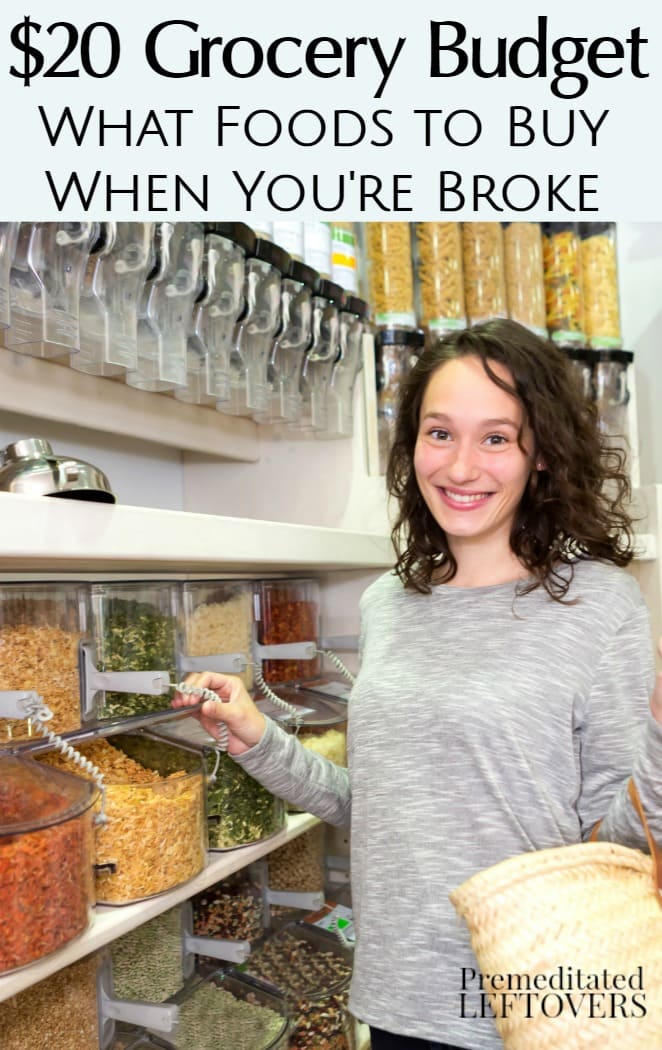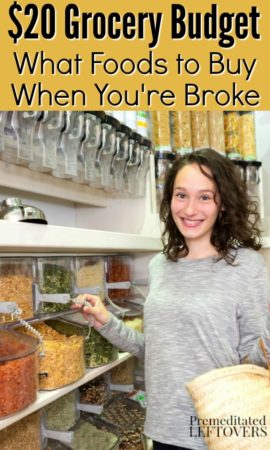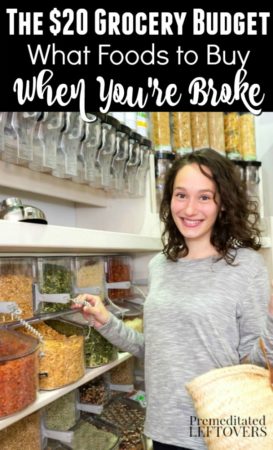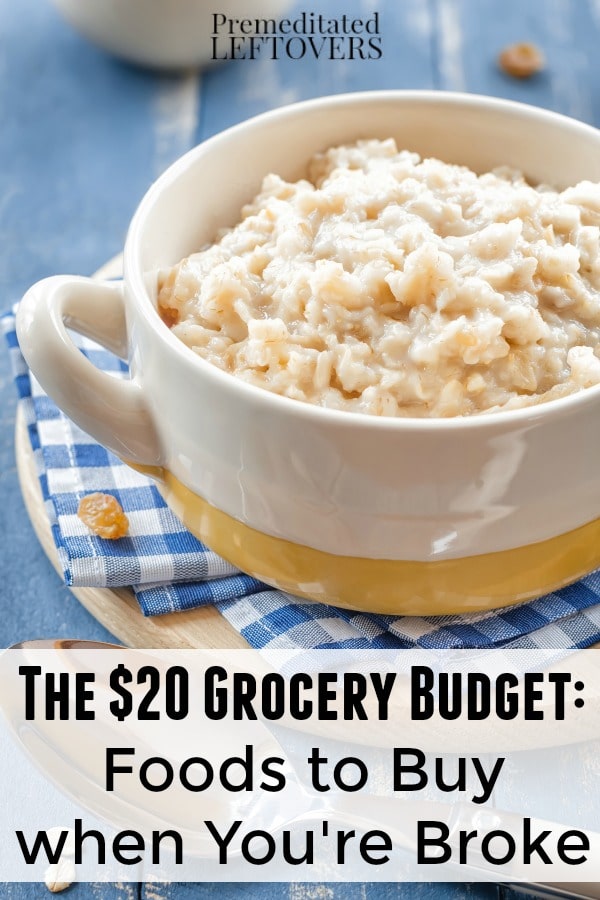Use these tips for what to buy when your finances are tight, so you can stretch a $20 grocery budget for the week.

There have been many times in my life, especially when I was living paycheck to paycheck when I was younger, that I found myself with a very small grocery budget. Even as low as $20 at times. This feeling of food insecurity is incredibly stressful. If you find yourself in it, you may be wondering what you should buy when you only have $20 for food to feed your family for the week. Here are some ways to stretch The $20 Grocery Budget as far as possible and what you should get at the store to provide good meals.
The $20 Grocery Budget
You don’t need to buy everything on this list at once as it exceeds $20, but the items here will help you get the most out of your budget.
Beans – Beans provide a great source of protein and are filling. And they can be used in so many ways from rice and beans to wrapped in tortillas for a bean burrito. If you happen to have any meat in your freezer, you can add beans to any dish to stretch the meat out further as well. To get more for your money, opt for dry beans and the skip cans.
Rice in Bulk– Rice is another good filler that provides a great source of grain. Rice can be added to other things to create casseroles, soups, and wraps. You can buy several pounds of rice for less than $2 in the bulk section of most stores and a little goes a long way.
Bananas– Bananas are almost always the cheapest fruit no matter what season it is and they are a great source of potassium. You can also use bananas to create sandwiches with a little peanut butter for a good filling lunch.
Potatoes – Like rice, potatoes are good for fillers in casserole dishes. Potatoes also can be made so many ways because they are versatile.
Tofu- This is not a common thing you see on many lists like this. Many people think it’s expensive or they are afraid to try it. The truth is, tofu is an excellent source of protein and it is usually very low cost. I can get an entire brick of it to feed a whole family for less than $2. Compared to meat, this is a big money saver.
Frozen Vegetables- If you stick with the basics like peas, green beans, and corn, frozen vegetables are usually cheaper than fresh and have more nutrients and less sodium than a can vegetable for often the same price. They work well in casseroles, soups and as a side dish.
Canned Tomato Puree- I buy this all the time for many things and at places like Costco, you can get a gallon can of it for around $3. You can make a huge pot of spaghetti sauce or chili and use the leftovers for another meal.
Eggs- Eggs have gotten reasonable in price again and they are an excellent way to fill up and do it for cheap. Eggs only cost around 20 cents each or less, so they can be a great option when you are broke.
Green Onions– If you can afford to throw these in there, they are great for adding some flavoring to things for a low cost. They are only about 50 cents a bunch most of the year and you can also regrow them a second time with no garden at all! All you do is cut the onions down to just above the white roots and place the roots in water in a semi-sunny spot. No dirt necessary! In a couple of days, you will have regrown green onions!
Oats in Bulk – Buying quick oats in bulk is a great way to have a filling breakfast every morning and it is super low cost as well. Jazz it up with some maple syrup, brown sugar, raisins, or fresh fruit if you have any.
Tips to Help Your Stretch a Small Grocery Budget
If you want fresh fruit or vegetables, make sure you shop in season. You will find that the produce that is in-season will be much more inexpensive than out of season produce.
Don’t be afraid to ask for help from a food bank. There were many times I would go ‘shopping’ at the food bank before going to the store so I could buy less at the store with what I got in my food box. If you have no way to get to a food bank and that is what is stopping you, consider asking if they deliver. Many small food banks do.
Coupon if you can. Look for coupons for the items you plan to buy. I have seen coupons for many of the things I listed above including eggs, tomato puree, tofu, and frozen vegetables. The less you have to spend, the more you may be able to get.
Supplement some meals with soup kitchens. Many people don’t realize that soup kitchens are not just for the homeless. Anyone can go eat at them and often, it’s some great homemade eats. If you get lunch taken care of there, you only have to worry about dinner.
Prepare Homemade Foods- Making bread is much cheaper than buying it (as is a lot of meals). Make what you can at home rather than buying convenience foods. You will stretch your dollar a lot further.
More Ways to Stretch your Grocery Budget
Extreme Grocery Savings without Extreme Couponing
How to Buy Whole Foods on a Limited Budget
How to Build a Depression Era Pantry
How to Eat Healthy on Food Stamps
How to Stretch Your Food Stamp and WIC Budget
Frugal Recipes
Frugal and Filling Depression Era Breakfasts




Grandma of five says
Don’t forget about food banks. If you make too much money to qualify for free food, our local food bank puts out free bread daily at 9:30am. Most of the time there is free cookies, cakes and muffins. Sometimes they also put out excess bananas, lettuce and leftover bakes potatoes from Olive Garden. No one knows what will be put out. Go to your local food bank and ask some questions, if you have a car.
Hollyjots says
During my high school years, it was just daddy, my little sister, a niece, a nephew and I. Daddy started having heart problems and we were dependent on my income. This was before the child labor laws required work permits. I worked several part time jobs. I remember walking to the store with just $10 most weeks.
I could not always afford yeast so I would reserve the water from rinsing cut up potatoes and created a yeast starter so I would only need flour and salt to make dough. I would remove a portion of the starter 3 times a week and make bread products. I would feed the starter on Sunday mornings to keep it going. I made weeks of dinner rolls and pizza dough on just one packet of yeast from a strip of 3 packets.
I would make a tuna noodle pasta salad which was mostly cooked elbow macaroni with a can of tuna and drained peas and hard boiled eggs and mayonnaise. For another meal, I would top my homemade pizza crust with spaghetti sauce and whatever cut up meat and cheese I had available. I made a cheap meal of spaghetti with tomato sauce each week. It was basically the same cheap meals rotated week after week because as a 15 year old going to high school and working, I could not afford much on my income.
As the decades passed by, I had a middle class lifestyle and my diet changed. Then I got cancer and it all went downhill from there. I am back on a $10 a week grocery budget. Thankfully, I only shop and cook for myself as the cost of groceries has gone up over the years.
Lady of the Lake says
Instead of a soup sometimes, I would make hash. Thursdays were hash night. I had one of those hand grinders that you hook to a table and would grind up any leftovers in the frig, including green beans, a hot dog, or whatever was in there. Fry it up and serve with catsup! Delicious! Husband got paid on Fridays and when he got home I would go to the store and shop for the next week. Didn’t hurt us one bit to eat frugally. Can remember my mom serving creamed peas on toast after WW!!.